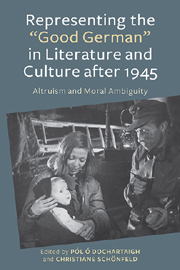Book contents
- Frontmatter
- Contents
- List of Illustrations
- Acknowledgments
- Introduction: Finding the “Good German”
- 1 Re-Presenting the Good German: Philosophical Reflections
- 2 “Görings glorreichste Günstlinge”: The Portrayal of Wilhelm Furtwängler and Gustaf Gründgens as Good Germans in the West German Media since 1945
- 3 From Hitler's Champion to German of the Century: On the Representation and Reinvention of Max Schmeling
- 4 Wilhelm Krützfeld and Other “Good” Constables in Police Station 16 in Hackescher Markt, Berlin
- 5 The “Good German” between Silence and Artistic Deconstruction of an Inhumane World: Johannes Bobrowski's “Mäusefest” and “Der Tänzer Malige”
- 6 Saints and Sinners: The Good German and Her Others in Heinrich Böll's Gruppenbild mit Dame
- 7 Being Human: Good Germans in Postwar German Film
- 8 “The Banality of Good”? Good Nazis in Contemporary German Film
- 9 Memories of Good and Evil in Sophie Scholl — Die letzten Tage
- 10 Deconstructing the “Good German” in French Best Sellers Published in the Aftermath of the Second World War
- 11 Macbeth, Not Henry V: Shakespearean Allegory in the Construction of Vercors's “Good German”
- 12 A Good Irish German: In Praise of Hugo Hamilton's Mother
- 13 Shades of Gray: The Beginnings of the Postwar Moral Compromise in Joseph Kanon's The Good German
- Works Cited
- Filmography
- Notes on the Contributors
- Index
2 - “Görings glorreichste Günstlinge”: The Portrayal of Wilhelm Furtwängler and Gustaf Gründgens as Good Germans in the West German Media since 1945
Published online by Cambridge University Press: 05 June 2013
- Frontmatter
- Contents
- List of Illustrations
- Acknowledgments
- Introduction: Finding the “Good German”
- 1 Re-Presenting the Good German: Philosophical Reflections
- 2 “Görings glorreichste Günstlinge”: The Portrayal of Wilhelm Furtwängler and Gustaf Gründgens as Good Germans in the West German Media since 1945
- 3 From Hitler's Champion to German of the Century: On the Representation and Reinvention of Max Schmeling
- 4 Wilhelm Krützfeld and Other “Good” Constables in Police Station 16 in Hackescher Markt, Berlin
- 5 The “Good German” between Silence and Artistic Deconstruction of an Inhumane World: Johannes Bobrowski's “Mäusefest” and “Der Tänzer Malige”
- 6 Saints and Sinners: The Good German and Her Others in Heinrich Böll's Gruppenbild mit Dame
- 7 Being Human: Good Germans in Postwar German Film
- 8 “The Banality of Good”? Good Nazis in Contemporary German Film
- 9 Memories of Good and Evil in Sophie Scholl — Die letzten Tage
- 10 Deconstructing the “Good German” in French Best Sellers Published in the Aftermath of the Second World War
- 11 Macbeth, Not Henry V: Shakespearean Allegory in the Construction of Vercors's “Good German”
- 12 A Good Irish German: In Praise of Hugo Hamilton's Mother
- 13 Shades of Gray: The Beginnings of the Postwar Moral Compromise in Joseph Kanon's The Good German
- Works Cited
- Filmography
- Notes on the Contributors
- Index
Summary
Amongst the objects of German efforts to come to terms with the Nazi past (Vergangenheitsbewältigung) the memory of fellow travelers in the arts is one of the most controversial. These artists, who often disagreed with most or all of the regime's ideology, decided not to emigrate as many of their fellow artists did. Instead, they continued to perform in Germany, and in many cases accepted that the Nazis used them as cultural icons, for example to promote the regime abroad or to convey ideological messages through the medium of art. Their decision to stay and perform has stimulated ongoing debates among other artists, journalists, and the public at large. On the one hand, both their privileged positions in the regime and the close relations that many maintained with leading Nazi politicians have been assessed critically. Yet these artists have also been interpreted as “good Germans,” who took up the difficult challenge of living and working in everyday Nazi Germany while trying to retain moral integrity and sustain German culture.
Two of the most prominent artists on the cultural stage in Nazi Germany were the conductor Wilhelm Furtwängler (1886–1954) and the actor and theater director Gustaf Gründgens (1899–1963). Initially their careers, which were already well on the way to an outstanding national and, especially in Furtwängler's case also international, reputation, flourished further after the National Socialists' seizing of power. Furtwängler accepted positions as head of the Berliner Staatsoper and vice-president of the National Socialist Reichsmusikkammer in 1933.
- Type
- Chapter
- Information
- Representing the "Good German" in Literature and Culture after 1945Altruism and Moral Ambiguity, pp. 29 - 49Publisher: Boydell & BrewerPrint publication year: 2013



